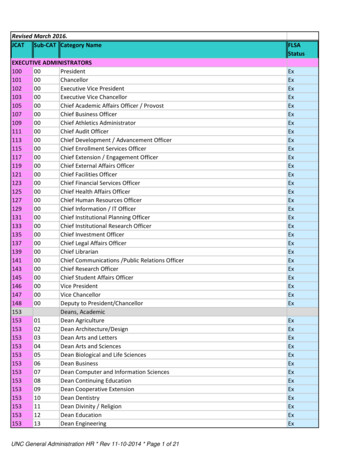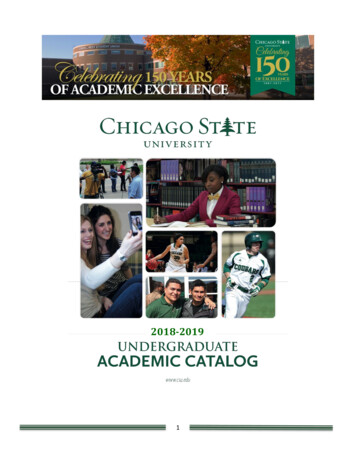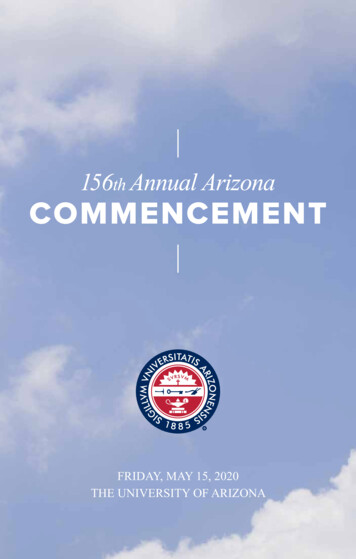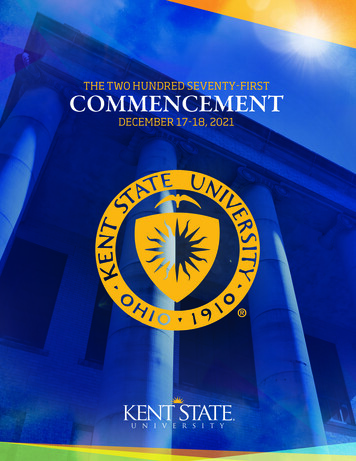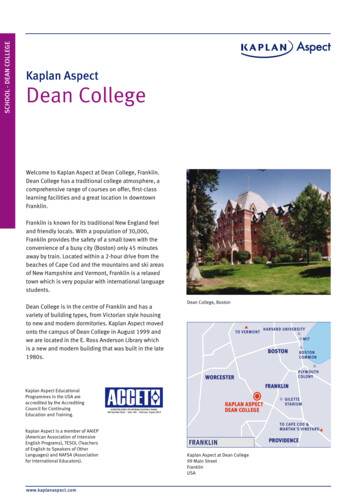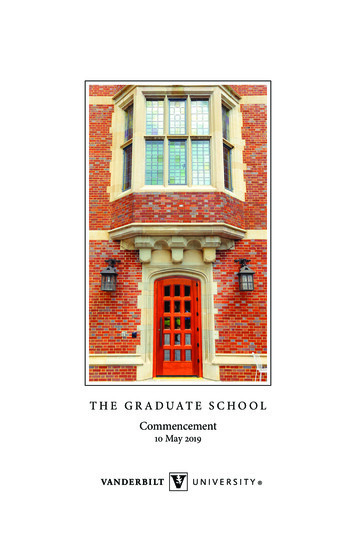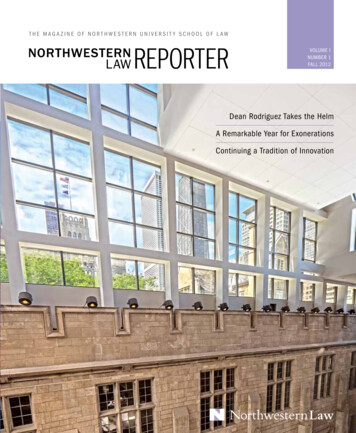
Transcription
T HE MAGA ZINE OF NOR T HWEST ERN UNIVERSI T Y SCHOOL OF L AWVOLUME INUMBER 1FALL 2012Dean Rodriguez Takes the HelmA Remarkable Year for ExonerationsContinuing a Tradition of Innovation
Northwestern Law ReporterFall 2012, Volume I, Number 1Dean and Harold WashingtonProfessorDaniel B. RodriguezDirector of Marketing andCommunicationsKathleen GleesonManaging EditorLaura Wolff ScanlanAssociate Dean of Enrollment,Career Strategy, and MarketingDonald L. RebstockPhotographyRandy Belice, Teresa Crawford,Sally Ryan, Jim ZivAssociate Dean for Developmentand Alumni RelationsJaci ThiedeProduced by NorthwesternUniversity School of Law andDepartment of UniversityRelations.Director of Alumni RelationsJulie ChinThe editors thank the faculty,staff, students, and alumni ofNorthwestern University Schoolof Law for their cooperation inthis publication.Opinions expressed in theNorthwestern Law Reporter donot necessarily reflect the viewsof Northwestern UniversitySchool of Law or NorthwesternUniversity.Update Your AddressEmail: law-alumni@law.northwestern.eduWeb: www.law.northwestern.edu/alumni/connectionsPhone: 312-503-7609US Mail: Northwestern UniversitySchool of Law, Office of AlumniRelations and Development,375 East Chicago Avenue,Chicago, Illinois 60611Find us online atwww.law.northwestern.eduCopyright 2012 NorthwesternUniversity School of Law.All rights reserved.9-12/19M/NL-GD/1311-1
THE MAGA ZINE OF NORTHWESTERN UNIVERSIT Y SCHOOL OF L AWVOLUME INUMBER 1FALL 201212244749DEPARTMENTSFEATURES13 A Conversation with Dean Daniel B. RodriguezThe new dean talks about ambitions worthy of a greatlaw school.24 Righting Wrongs2From the Dean3Noteworthy20Clinic News28Faculty FocusThe Center on Wrongful Convictions has a triumphant year.42 Moving ForwardInnovative curricular and admissions programs bridge the legalacademy and the legal profession.466028Faculty News31New Faculty36Faculty PublicationsAlumni Notes46Alumni News50Alumni Profiles54Class Notes58In MemoriamClosing Remarks
FROM THE DEANIam happy to reintroduce the Northwestern Law Reporter. We have decided to bring the Reporterback after a 15-year absence as a forum to inform our community and other interested friendsof the news from Northwestern.The years between the last issue of the Reporter and now have witnessed enormous, foundationalchanges in legal education and at our Law School in particular. As you will see in the pages that follow,Northwestern’s law community has been hard at work developing innovative, rigorous programs andinitiatives to ensure that the quality of legal education at Northwestern is first-class.When we speak of the Northwestern Law difference, we have in mind several elements of note.Our unique admissions approach brings in an experienced student body, one vetted through not onlyreview of academic credentials but also careful interviews. Our elaborate orientation program not onlyprovides useful information about what is in store for new first-year law students but also inculcatesin them values of professionalism and service. The first-year instruction includes high-caliber teachingby full-time faculty members in manageably sized sections, with close attention to legal writing andadvocacy in our distinctive communications and legal reasoning program. And beyond the second year,Northwestern students can and do take advantage of an extraordinary array of intra- and extracurricularprograms, including, in particular, the Bluhm Legal Clinic. In this issue of the Reporter, you will learnmuch about these excellent programs—about the Northwestern Law difference in action.You will also learn new things about our incredible alumni. Northwestern Law graduates are makinga difference throughout the nation and around the world. They are leaders in the legal profession,key government officials, captains of industry, innovators and entrepreneurs, academics, and lawyersserving the public interest. The achievements and support of our alumni undergird the great legacy ofthis venerable law school.In January I joined the Law School as its 10th dean. I was immediately captivated by the beauty ofour Chicago campus, nestled between a great, vibrant city and the vast reaches of Lake Michigan. It is,in my view, the most attractive, functional setting of any major urban law school in the United States.And I was captivated, as well, by the wonderfully supportive and consistently interesting group ofstudents, faculty, and staff, all working hard to make Northwestern a fertile home for the study of law.Despite Northwestern’s great strengths and reputation, we cannot and will not rest on our laurels.Legal education is encountering difficult challenges, and it is imperative that our Law School play aleadership role in adapting to the forces of the legal marketplace while preserving our commitmentto our core values. The years to come for Northwestern and for the legal profession will be bothchallenging and exhilarating. Meanwhile, we will move ever forward, building on current strengths,enhancing our academic programs, hiring top faculty, recruiting the best students, building bridgeswith the legal profession and the business sector, and looking always at opportunities for innovationand for improving our competitive position. These are the ambitions worthy of a great law school.Enjoy reading this first issue of the new Northwestern Law Reporter, and stay tuned. There is muchmore to come.49Daniel B. RodriguezDean and Harold Washington Professor2 NORTHWESTERN LAW REPORTER
NOTEWORTHYUS Attorney General Delivers MajorPolicy Speech at Law SchoolTop: US attorney general Eric Holder. Bottom: Holder fields questions from students.An audience of 700 heard US attorney general Eric Holder explain theuse of federal courts and military commissions in combating terrorism.He also discussed the steps taken before lethal force can be used againstUS citizens linked to terrorism, particularly US citizens in a foreigncountry who are senior operational leaders of al Qaeda or associatedforces and who are actively engaged in planning to kill Americans.“The Constitution empowers the president to protect the nation fromany imminent threat of violent attack,” Holder said. “And internationallaw recognizes the inherent right of national self-defense. None of this ischanged by the fact that we are not in a conventional war.”Prior to Holder’s address, he met with law students and fielded questions, sharing insights ranging from his personal life to his day-to-dayrelationship with President Obama, said Jason Turkish (JD ’12). Thediscussion included Holder’s thoughts about how the relationshipbetween the attorney general’s office and the White House continues toevolve since 9/11.“I felt very inspired,” Turkish said. “The attorney general talked abouthow students from a school like ours have a unique opportunity to usetheir talents and idealism to become the next generation of lawyers whocan make a difference. He stressed that the country will suffer if we don’tstep up to the plate.”Attorney General Holder began his remarks by stating, “For morethan 150 years, this law school has served as a training ground for futureleaders; as a forum for critical, thoughtful debate; and as a meeting placeto consider issues of national concern and global consequence. Thisafternoon, I am honored to be part of this tradition.” nGlobal Village Celebrates School’s DiversityIn February more than 500 students, staff,faculty, families, and representatives from sixconsulates celebrated Northwestern Law’sdiverse cultural community at Global Village,a night of food, drink, entertainment, andmusic from around the world in the Law SchoolAtrium.Participants tasted food and beverages frommore than 20 countries. Activities includedperformances, trivia and Lotería games, calligraphy lessons, henna body tattooing, and tai chi.“This event is such a hit,” said Adi Altshuler,director of international programs. “It bringsthe whole community into the Atrium andgives our LLM students a great way to sharetheir countries’ foods and traditions. Manystudents say that Global Village is their favoriteevent of the year because it brings everyonetogether and is an opportunity for studentsacross the JD and LLM programs to worktogether. The students work hard to make it asauthentic as possible.” nFALL 2012 3
NOTEWORTHYBreakthrough Discovery PropelsNorthwestern TeamJD-MBA STUDENTS ARE REVOLUTIONIZING CLEAN ENERGYNuMat Technologies, an interdisciplinary teamof students from the Law School and threeother Northwestern schools, is on a winningstreak with its breakthrough discovery usingnanomaterials called metal organic frameworks(MOFs) in natural gas–fueled vehicles. SinceMarch, NuMat has taken in 1.3 million inprize money.Using a new algorithm, NuMat was able toidentify 140,000 new MOFs in less than threedays—14 times the number of MOFs thathave been discovered in the last 15 years—anddiscovered one that has the highest naturalgas storage capacity of any known material inthe world. The research team was then able tosynthesize the promising material and found itbested the natural gas storage target of the USDepartment of Energy (DOE) by 10 percent.“MOFs soak up gases just like a bath spongesoaks up water; they can be designed at anatomic level to capture some gas molecules butnot others,” says CEO Ben Hernandez. “Thismakes MOFs perfect for gas storage or separation applications. Our materials can be used tostore the equivalent amount of natural gas in thetank, but at one-fifth the pressure, significantlyimproving the economics of natural gas vehicles.This will facilitate an accelerated transition tonatural gas vehicles, which are cleaner thanexisting gasoline- or diesel-based transportationsolutions, and support a gradual reduction inthe dependence on foreign sources of oil.”NuMat represents a mix of operationaland technical expertise. Two team members,Hernandez and Tabrez Ebrahim, are JD-MBAstudents at the Law School and the KelloggSchool of Management. Hernandez has a BS inindustrial engineering and management sciences and worked at Arcapita, a global privateequity firm. Ebrahim, the chief operating officer,4 NORTHWESTERN LAW REPORTERhas an MS in mechanical engineering. ChrisWilmer, a chemical and biological engineeringdoctoral student at Northwestern’s McCormickSchool of Engineering and Applied Science,is the chief technology officer and inventor ofNuMat’s proprietary MOF discovery algorithm.Omar Farha, a research associate professor ofchemistry at Northwestern’s Weinberg Collegeof Arts and Sciences, is the chief scientificofficer.The concept of NuMat began in 2011 whenEbrahim began evaluating materials scienceresearch and patents and classmate Hernandezwas looking to launch a startup company.Meanwhile, across campus, Wilmer and Farhahad developed a patent-protected process in thelabs of Randall Q. Snurr, professor of chemical and biological engineering at McCormick,and Joseph T. Hupp, professor of chemistry atWeinberg. Through networking, Ebrahim foundWilmer’s computational research and thought itappealing because his algorithm was predictiveand highly accurate, enabling capitally efficientclean-tech commercialization.“Northwestern is a world leader in MOFresearch led by Professors Snurr and Hupp,”Above: The yellow sphere in this MOF represents the space where gas molecules can be stored.Below: NuMat Technologies took first place in the DOE’s inaugural National Clean Energy Business Plan Competition in Washington, DC.From left: Tabrez Ebrahim (JD-MBA ’13), Omar Farha, Chris Wilmer, and Ben Hernandez (JD-MBA ’13).
NuMat Technologies pitches its business plan to a panel of energy sector experts in Washington, DC. (Department of Energyphoto by Ken Shipp)investors from around the country served assays Ebrahim. “Chris and Omar had alreadyjudges.produced breakthrough MOF research. The keyEbrahim says he doesn’t know “if there isinventors of Northwestern’s MOF patents areone answer” to why NuMat has won so manyProfessors Snurr and Hupp, Omar, and Chris—competitions. “I like to think that it is simplyall world-renowned researchers in their fields.”With Hernandez and Ebrahim’s business and preparation plus passion meets timing plus fate.We all have worked really hard, and there islegal skills added to the mix, NuMat was born.some internal drive well beyond just the lure ofIn June the team took first place in the firstmoney pushing us; that combined with marketever DOE National Clean Energy Business Planinterest and some element of lightning strikingCompetition in Washington DC. US energyhas made NuMat what it is today.”secretary Steven Chu complimented the win(Or maybe it’s the ties. Team members wearners: “The winning team from Northwesternneckties depicting MOFs designed in their labsUniversity worked to build a promising newto every competition. Ever thematerials technology, developentrepreneurs, the team sellsan effective business plan, and “We are excited to wina selection of ties and coffeesell the idea to potential inves- these competitions,mugs on Zazzle, a merchantors, laying the groundworkthrilled to representdising website.)for future economic opportuNorthwestern University,“We are excited to winnities that will ensure Americaand motivated to continue these competitions, thrilledremains competitive in theto represent Northwesternglobal clean energy race.” At an to build our business.”University, and motivated toawards ceremony at the White —Tabrez Ebrahimcontinue to build our busiHouse, NuMat was awardednessaroundbreakthroughresearch done bya 100,000 cash prize and 80,000 worth of inProfessors Snurr and Hupp, Omar, and Chris,”kind services, including technical, design, andsays Ebrahim.legal assistance.NuMat has attracted national media attenThe team’s biggest win so far—nearlytion from Fortune, Nature Chemistry, Crain’s 875,000 in prizes—came at the Rice BusinessChicago Business, Chemistry World, andPlan Competition in April. Billed as the world’sBusinessWeek and rang the closing bell of therichest and largest graduate-level business planNASDAQ twice this summer—in July for wincompetition and organized by the Rice Alliancening the University of Texas’s Global Venturefor Technology and Entrepreneurship and theLabs Investment Competition and in AugustJesse H. Jones Graduate School of Business,for winning the Rice Business Plan Competition.the contest allowed collegiate entrepreneursGoing forward, NuMat will be recruitingto compete for more than 1.5 million in cashadditional talent to round out its team. “It isand prizes. Since its inception in 2000, 128 pastcompetitors have gone on to successfully launch hard to predict the future. But we are hopefulthat we will grow as a startup,” says Ebrahim.their businesses and are still in business today,Despite already achieving success, bothraising in excess of 450 million in capital fundHernandezand Ebrahim feel that completinging. More than 250 venture capitalists and otherthe JD-MBA program will help them in theircareers.“I worked with several companies in a strategy consulting and private equity capacity andsaw firsthand how the law permeated boardlevel decisions,” Hernandez says, “so I soughtan education that integrated this perspective.Choosing Northwestern—the largest and bestintegrated JD-MBA program—was easy.”For Ebrahim, “the most attractive aspect wasthe ability to get two degrees, each from a topschool, in three years. I also felt that my careerhad involved both legal and business issues.I wanted to get an in-depth understanding ofboth sides—both in the classroom andby osmosis through interacting with alumniand classmates at both Kellogg and the LawSchool.” n —LWSNuMat Lands DOEFundingIn July the Gas Technology Institute wasawarded 1.5 million in Department ofEnergy funding to develop new adsorbentsfor low-pressure natural gas vehicles aspart of a project team that includes NuMatTechnologies, a research team fromNorthwestern University, and WestportInnovations. The undertaking is one of13 new research projects that shared 30million in DOE funding nationwide tosupport researchers who are developing cutting-edge methods for harnessingnatural gas supplies for cars and trucksand expanding the use of natural gas as avehicle fuel.FALL 2012 5
NOTEWORTHYLeft: Chief Judge Kozinski (right) with Dean Rodriguez.Below left: Illinois attorney general Lisa Madigan with Peter C. John andMichael A. Pope (JD ’69).Below right: Princeton University scholar Kim Lane Scheppele.School Hosts Three Public Lecture SeriesThree distinguished guest speakers—the Honorable Alex Kozinski of the US Court of Appealsfor the Ninth Circuit, Illinois attorney general Lisa Madigan, and Princeton University scholarKim Lane Scheppele—presented public lectures at the Law School the past year.Howard J. Trienens Visiting Scholar ProgramPope & John Lecture on ProfessionalismJulius Rosenthal Foundation Lecture SeriesThis year’s Howard J. Trienens Visiting JudicialScholar was Alex Kozinski, chief judge of theUnited States Court of Appeals for the NinthCircuit. Kozinski addressed contemporary andhistorical legal issues in a discussion moderated by Dean Rodriguez, who clerked for himfollowing law school. Kozinski was appointedto the Ninth Circuit in 1985 and became chiefjudge in 2007. He had earlier been chief judgeof the US Claims Court.The Howard J. Trienens Visiting ScholarProgram was established in 1989 by partners ofSidley Austin LLP to honor Trienens (JD ’49),a partner at the firm since 1956. A member ofthe Northwestern University Board of Trusteessince 1967, Trienens chaired the board from1986 to 1995.Illinois attorney general Lisa Madigan deliveredthe Pope & John Lecture on Professionalism,discussing the mortgage and foreclosure crisisin her talk “Legal Issues Facing State AttorneysGeneral.” In 2002 Madigan became the firstwoman elected to serve as the Illinois attorneygeneral. She had earlier been an Illinois statesenator and a litigator.Established by the firm of Pope & John in1991, the lecture series focuses on the manydimensions of a lawyer’s professional responsibility, including legal ethics, public service,professional civility, pro bono representation,and standards of conduct.Kim Lane Scheppele, the Laurance S.Rockefeller Professor of Sociology and PublicAffairs and director of the Program of Lawand Public Affairs at Princeton University, wasthe featured speaker at the Julius RosenthalFoundation Lecture Series. Her “InternationalState of Emergency: Legacies of the Global Waron Terror” lectures explored the effects of post9/11 antiterrorism activities on constitutionalism and democracy.The Julius Rosenthal Foundation was established in 1919 in memory of an eminent andbeloved Chicago attorney who died in 1905.Publication of the lectures has made a notablecontribution to legal literature and scholarshipfor decades. n6 NORTHWESTERN LAW REPORTER
New Global League Includes Northwestern LawNorthwestern Law joined 16 law schools from around the world in launching the Law SchoolsGlobal League at Tilburg University Law School in the Netherlands in June. Northwestern thus faris the only United States law school in the league, which promotes close cooperation in teachingand research.The establishment of the league—which includes top law schools in Europe, Australia, Brazil,China, Hong Kong, India, Israel, Russia, Singapore, and South Africa—represents “a historic occasion,” says Dean Rodriguez. It comes at a time when degree programs that traditionally were aimedat national law are increasingly concerned with cross-border issues. The league is the first formalnetwork of university law schools that aims to address these issues.“What this league promises is a constructive medium for exploring projects that are of significant value to our law students practicing in an increasingly global legal environment,” Rodriguez says.James B. Speta, associate dean of international initiatives at Northwestern Law, was also presentat the creation of the league. “From foreign students who come to Chicago for our leading programsto innovative overseas education, service, and outreach programs and partnerships, Northwesternhas long been a globally engaged law school,” he says. “Membership in the league is both confirmation of that engagement and an additional platform to extend our reach.”Also while at Tilburg University, Rodriguez, Speta, and other Northwestern Law School representatives attended a one-day symposium on the globalization of law.“Vigorous discussion at the meeting was focused on myriad forms of information delivery, comparative emphases on teaching and scholarship, different economic models of legal education, andcompeting frameworks of bench-bar relations,” Rodriguez said. “In short, we saw in action the pluralism of legal education.” nRetired justice John PaulStevens (JD ’47) donatedthe chair he used during histenure on the Supreme Courtof the United States to theLaw School. Nominated to theSupreme Court by PresidentGerald Ford in 1975, JusticeStevens served as an associatejustice for more than 34 yearsuntil his retirement in June2010. The chair is on display onthe Tiegler Bridge in the ArthurRubloff Building.AJD Program RatifiedNorthwestern Law School faculty in Februaryvoted unanimously to approve the AcceleratedJD (AJD) program—which began on an experimental basis three years ago—as an enduringprogram.Students in the AJD program complete thesame number of credit hours as three-year JDstudents but do so in five semesters over twocalendar years. AJD students benefit financiallyfrom being able to enter the workforce a yearsooner and forego one semester of educationrelated living expenses.The AJD is a core initiative of the LawSchool’s most recent strategic planning process.As the only program of its kind among top-tierlaw schools, it continues to mark NorthwesternUniversity Law School as an innovative leader.The program attracts excellent students whosebackgrounds and experiences greatly enrichthe overall learning environment and the LawSchool community. nSmallest Tuition Increasein 40 YearsNorthwestern Law School’s 2012–13 tuitionincrease of 3 percent is its smallest percentageincrease in 40 years.“During these challenging economic times,the Law School is committed to addressing therising cost of legal education and correspondingburdens of student indebtedness,” says DeanRodriguez. “Northwestern Law intends to be aleader in addressing the challenges of the newlegal economy.” nFALL 2012 7
Witness to a RevolutionRachel Lindner (JD ’12) arrived in Damascusin August 2010 on a Fulbright scholarship afew months before a series of antigovernmentuprisings that swept across North Africa andthe Middle East.“I can remember when the protests beganin Egypt and we would watch them on TV, thepeople I knew said it was an incredible historical event but never believed it would happen inSyria,” she recalls. “But as the protests spread toother countries, things got increasingly tensein Syria.”The first public demonstrations began inSyria in January 2011 but were small andsporadic. By March tensions heightened asprotests against the Bashar Al-Assad regimebegan in Dara’a. The challenges for Lindner,who was researching the disparity betweenflourishing and floundering nongovernmentalorganizations in the country, were increasedby the government’s sensitivity about outsidersresearching Syrian culture and laws. “Syrian lawregulates how much contact organizations areallowed to have with foreigners, so it becamecomplicated to establish contact and meetwith directors of organizations,” Lindner says.“Many organizations and charities in Syria arejust developing and do not want that kind ofattention.” Information was limited by statecontrolled media outlets. Lindner says SyriansThis page: View from the Citadel in Aleppo, Syria’s largest city,before the uprising.Top: Rachel Lindner (JD ’12).8 NORTHWESTERN LAW REPORTER
Recent Grad AwardedFulbright in IndiaAn Islamic Law class with Professor KristinStilt revived her interest in the Middle East.Stilt, who was once a Fulbright scholar in Egypt,encouraged and helped Lindner to apply forthe Fulbright fellowship in Syria. “ProfessorStilt helped me talk through my interests anddesign a project that would be acceptable toboth the American and Syrian governments,”says Lindner. The Fulbright program offersopportunities for students, scholars, and profesthemselves were wary of speaking out againstsionals to undertake international graduatethe government, even among friends, becausestudy, advanced research, and teaching init was known that secret police would reportelementary and secondary schools and universiperceived indiscretions. As security and milities worldwide.tary checkpoints became more common, it was,To prepare for the fellowship, LindnerLindner says, a “very tense time.”returned to Syria in early 2009 to conductWith a month left in her fellowship, theresearch, study Arabic, establish NGO andUS State Department gave Lindner and otherUN contacts, and secure a host organization.Fulbright fellows two days’ notice to leave Syria.Lindner said the respect she gained for the“It was heartbreaking to have to leave after I’dSyrian people during herbuilt networks and friendFulbright stay has becomeships,” says Lindner. “I felt as “To be a witness to such anmore important to her thanthough part of our job wasincredible social movementher research about NGOs.to be witnesses to what wasmade me think hard about“Even in situations wheregoing on, especially becausewhat I have to offer and wantpeople are being murderedthere weren’t very manyto offer in the future, bothby the thousands, it seemsforeigners in the countrypersonallyandprofessionally.”like there is still a senseto observe what happened.of hope among the SyrianWhile it was a painful expe—Rachel Lindner (JD ’12)people,” she says. “Peoplerience to watch the situationare talking about politics and taking mattersin Syria dissolve into what it is now and not beable to do anything about it, my experience gave into their own hands.”Since the uprising in March 2011, thousandsme focus. To be a witness to such an incredibleof Syrians have fled across the border to escapesocial movement made me think hard aboutthe violence. The UN estimates that more thanwhat I have to offer and want to offer in the20,000 people have been killed by securityfuture, both personally and professionally.”forces and thousands more detained. GivenLindner first visited Syria in 2008, a fewthe ongoing violence and deteriorating secumonths before entering Northwestern Law.rity situation, in February of this year the USShe had acquired an interest in Arabic andEmbassy in Damascus suspended operations.Middle Eastern culture after graduatingIn June a UN peacekeeping chief declared thatfrom college. “I was especially enamored ofSyria was in the midst of a civil war.Damascus,” she remembers. “Everyone wasLindner graduated from Northwestern Lawwarm and loving and showed great hospitality.inMayand is now working on capital defenseIt’s culturally and politically interesting andin Louisiana. n —Jennifer Westhistorically fascinating.”Adam Israelov (JD ’12) has been awardedthe Fulbright-Nehru Award, a ninemonth fellowship that began in August.He is conducting research on the role oflaw in the development of corporate socialresponsibility in India.“Because India has a rich history ofsocial responsibility, it serves as an excellent case study on demonstrating how thecapitalist desire for profit can be reconciled with corporate social responsibility,”says Israelov. “My research is intended toascertain whether India’s various legal andbusiness communities perceive a tensionbetween the law and corporate socialresponsibility practices. This programprovides me the opportunity to gain astronger grasp of India’s corporate lawsand a greater understanding of its diverseculture.”To prepare for the fellowship, Israelovcorresponded with a faculty adviser atJindal Global Law School in the NationalCapital Region of Delhi.FALL 2012 9
NOTEWORTHYSenior Research Program Produces Student ScholarsMore than 75 third-year students worked oneon-one with faculty members the past year toproduce publishable-quality research papers aspart of the Owen L. Coon/James A. Rahl SeniorResearch Program.“The senior research program is our hiddentreasure. It is the biggest distinction betweenNorthwestern and all other law schools,” saysProfessor Martin Redish, who collaboratedon two projects in 2011–12, “DisgustingSpeech and the First Amendment” withJamie Gliksberg (JD ’12) and “Constitution,Inc.: Constitutional Theory and the ModernCorporation” with Peter Siegal (JD ’12).Redish believes the program is an assetfor both student and faculty: “In my 40 yearsat Northwestern, there is nothing that I haveloved more. It is an enclave of graduate schoolcollaboration in a law school setting, whereintensive one-on-one educational experiencesare rare. It is an amazing synthesis of pedagogical and intellectual experience for both studentand professor.”John Meixner (JD-PhD ’13) worked withProfessor Shari Diamond to produce “Do10 NORTHWESTERN LAW REPORTERothers entangled in insider trading scandals,Criminal Trial Rates Affect the Vanishing Civilincluding business magnate and owner of theTrial?” and presented it at the annual CliffordDallas Mavericks Mark Cuban, stock traderSymposium on Tort Law and Social Policy atDePaul University this past spring. Meixner, the Ivan Boesky, and founder and former CEOof the biopharmaceutical company ImCloneonly student to participate in a panel discussionSystems Samuel Waksal.at the symposium, says, “It“The senior research“Senior research offerswas a fantastic opportunitystudents a chance not onlyto be a part of an importantprogram offers a chance forto explore legal doctrines,project that we could showour students to work oneas they do in their exams,case to well-respected scholon-one with profe
Hernandez and Tabrez Ebrahim, are JD-MBA students at the Law School and the Kellogg School of Management. Hernandez has a BS in industrial engineering and management sci-ences and worked at Arcapita, a global private equity rm. Ebrahim, the chief operating o cer, Breakthrough Discovery Propels Northwestern Team


